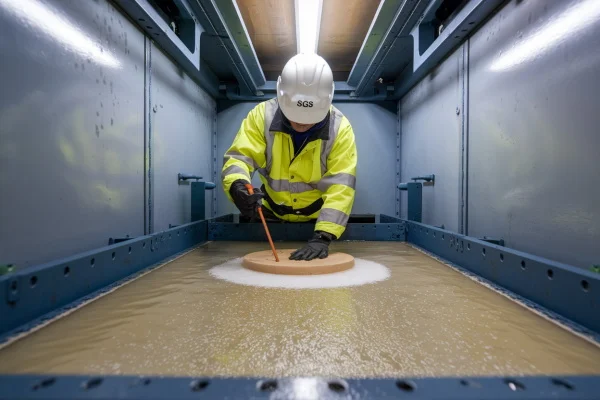In manufacturing, quality assurance is the cornerstone of delivering reliable and safe products. For the automotive and electronics industries, rigorous testing ensures that every product meets performance and regulatory standards. This blog explores three critical quality control methods: the Salt Spray Test, the Rockwell Hardness Test, and RoHS Compliance, verified through SGS Reports.

Salt Spray Test: Ensuring Corrosion Resistance
The Salt Spray Test(also known as the salt fog or salt mist test) is a standardized method used to evaluate the corrosion resistance of materials and coatings. This test is particularly vital for industries where products are exposed to harsh environmental conditions, such as marine, automotive, and construction.
How the Salt Spray Test Works
The test involves placing a sample in a chamber filled with a saltwater solution, which is continuously sprayed to create a highly corrosive environment. The sample is monitored over a set period to assess the material or coating’s resistance to corrosion.
Key Standards
· ASTM B117: A widely used standard for salt spray testing.
· ISO 9227: An international equivalent, ensuring global applicability.
Applications
· Automotive Components: Evaluating the durability of galvanized steel or aluminum parts.
· Metal Coatings: Testing the performance of anti-corrosion coatings like zinc or powder coatings.
· Electronics: Ensuring the longevity of connectors and circuit boards exposed to moisture.
Rockwell Hardness Test: Measuring Material Strength
The Rockwell Hardness Test is a mechanical test used to determine a material’s hardness by measuring its resistance to deformation. This test is crucial for understanding the mechanical properties of metals, plastics, and composites, ensuring they meet the required specifications for durability and performance.
Applications
· Tool Manufacturing: Ensuring cutting tools have the necessary hardness for long-term performance.
· Automotive Industry: Verifying the hardness of gears, shafts, and other critical components.
· Aerospace: Evaluating the durability of structural materials.
Common Rockwell Scales
· HRC (Rockwell C): For hard metals like steel and alloys.
· HRB (Rockwell B): For softer metals such as copper and aluminium.
· HRM/HRL: For plastics and composites.
RoHS Compliance and SGS Reports: Meeting Environmental Standards
With growing concerns over environmental sustainability, manufacturers must ensure their products comply with strict regulations. RoHS Compliance(Restriction of Hazardous Substances) is a directive that limits the use of specific hazardous materials in electronic and electrical products.
What is RoHS Compliance?
RoHS restricts substances such as lead (Pb), mercury (Hg), cadmium (Cd), and hexavalent chromium (Cr6+), which are harmful to both human health and the environment. Products must meet these standards to be sold in many global markets, including the EU.
Role of SGS Reports
SGS(Société Générale de Surveillance) is a leading certification body that provides third-party verification of RoHS compliance. An SGS report certifies that a product has been tested and meets RoHS standards, providing manufacturers with a trusted quality mark.
Applications
· Consumer Electronics: Ensuring smartphones, laptops, and home appliances are free of hazardous substances.
· Medical Devices: Verifying compliance for devices used in sensitive environments.
· Automotive Electronics: Certifying that vehicle control systems meet environmental standards.
The Synergy of Testing Methods
While each of these tests serves a distinct purpose, they often work together in a comprehensive quality assurance program.
1. Salt Spray testing ensures that materials or coatings can withstand corrosive environments, extending product life.
2. Rockwell Hardness Testing verifies the mechanical strength of materials, crucial for structural integrity.
3. RoHS Compliance, backed by SGS Reports, guarantees that products meet environmental and safety regulations, opening doors to global markets.
Case Study: Quality Control in Automotive Manufacturing
Consider an automotive manufacturer producing electronic control units (ECUs):
Salt Spray Tests
ensure that the metal housing of the ECU can withstand prolonged exposure to salt and moisture, common in road conditions.
Rockwell Hardness Tests
verify the durability of internal components, such as connectors and mounts.
RoHS Compliance
guarantees that the ECU meets global environmental standards, ensuring marketability in regions like the EU and Japan.
This multi-faceted approach ensures the product’s performance, safety, and compliance, providing a competitive edge in the market.

Emerging Trends in Quality Assurance
Automated Testing Systems
Advanced automated systems can perform salt spray and hardness tests more efficiently, reducing human error and increasing throughput.
Real-Time Monitoring
IoT-enabled devices can monitor environmental conditions during salt spray tests, providing real-time data for more precise analysis.
Enhanced RoHS Testing
As regulations tighten, testing labs are adopting more sensitive equipment to detect even trace levels of restricted substances.
Quality assurance is not just about meeting industry standards; it’s about ensuring customer satisfaction and building a strong reputation. Manufacturers can deliver products that excel in performance, durability, and environmental responsibility by integrating Salt Spray Tests, Rockwell Hardness Tests, and RoHS Compliance into their quality control processes.
These testing methods, backed by trusted certifications like SGS Reports, form the backbone of a robust quality assurance strategy, enabling manufacturers to thrive in competitive and highly regulated markets.